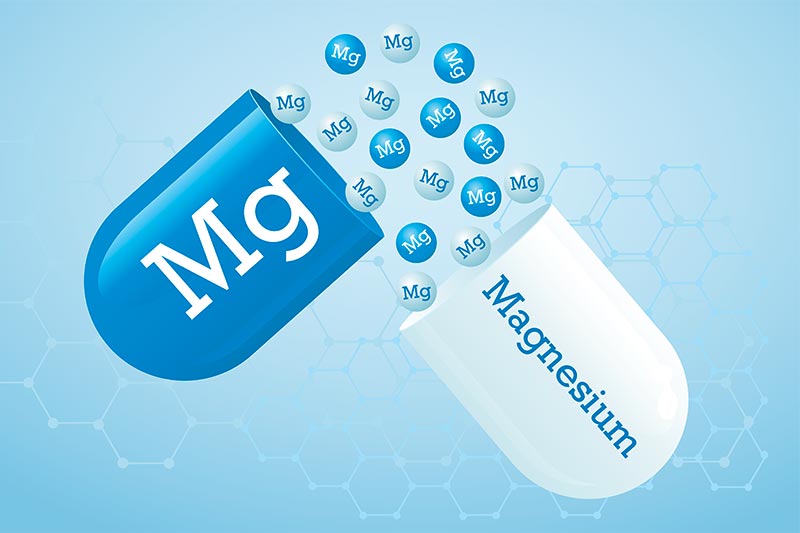
High blood pressure (hypertension) is a major risk factor for cardiovascular disease and affects millions worldwide. Managing blood pressure effectively is critical to reducing the risk of heart attacks, strokes, and other complications. Among the many dietary factors studied for their influence on blood pressure, magnesium has attracted considerable attention. But what does the scientific evidence say about magnesium’s role in blood pressure regulation?
The Role of Magnesium in the Body
Magnesium is an essential mineral involved in over 300 enzymatic reactions, including those that regulate muscle and nerve function, blood glucose control, and blood pressure. It plays a vital role in:
●Relaxation of blood vessels (vasodilation)
●Electrolyte balance, including calcium and potassium regulation
●Energy production and cellular metabolism
Because of its effect on vascular tone and muscle relaxation, magnesium is believed to help regulate blood pressure.
Mechanisms Linking Magnesium to Blood Pressure
Magnesium influences blood pressure through several biological pathways:
●Vascular smooth muscle relaxation: Magnesium blocks calcium channels in smooth muscle cells of blood vessels, preventing calcium-induced contraction. This leads to relaxation and dilation of blood vessels, lowering vascular resistance.
●Electrolyte balance: Magnesium helps maintain the balance of sodium, potassium, and calcium — electrolytes critical for normal blood pressure regulation.
●Endothelial function: Magnesium improves the function of the endothelium, the inner lining of blood vessels, enhancing nitric oxide production which helps vessels dilate.
●Anti-inflammatory and antioxidant effects: Chronic inflammation and oxidative stress contribute to hypertension. Magnesium may reduce these factors.

Evidence from Clinical Studies
Researchers have conducted numerous studies to evaluate whether magnesium supplementation can lower blood pressure in humans. Here are some key findings:
1. Randomized controlled trials (RCTs):
A comprehensive meta-analysis published in Hypertension (2017) combined results from 34 RCTs involving over 2,000 participants. It found that magnesium supplementation reduced systolic blood pressure by approximately 2-4 mmHg and diastolic pressure by about 1-2 mmHg on average.
Notably, people with hypertension or magnesium deficiency showed greater blood pressure reductions compared to healthy individuals with normal magnesium levels.
2. Observational studies:
Large epidemiological studies have shown that higher dietary magnesium intake correlates with lower blood pressure and reduced risk of developing hypertension. For example, data from the National Health and Nutrition Examination Survey (NHANES) suggest that magnesium intake is inversely associated with blood pressure.
3. Population-specific effects:
The beneficial effects of magnesium may be more pronounced in certain groups, such as older adults, individuals with metabolic syndrome, or those with low dietary magnesium intake.

Limitations and Safety Considerations
While the evidence supports a modest blood pressure-lowering effect of magnesium, there are some caveats:
●The magnitude of blood pressure reduction is relatively small compared to standard medications.
●Magnesium supplementation alone is unlikely to replace antihypertensive drugs but can be a useful complementary strategy.
●Excessive magnesium intake, especially from supplements, can cause side effects like diarrhea, nausea, and in severe cases, heart rhythm disturbances.
●Individuals with kidney impairment should use magnesium supplements cautiously, as impaired renal function can lead to magnesium accumulation.
Dietary Sources and Recommendations
Given the safety profile and potential benefits, ensuring adequate magnesium intake through diet is advisable. Rich dietary sources include:
●Leafy green vegetables (spinach, kale)
●Nuts and seeds (almonds, pumpkin seeds)
●Whole grains (brown rice, oats)
●Legumes (black beans, chickpeas)
●Fish (mackerel, salmon)

The Recommended Dietary Allowance (RDA) for magnesium varies by age and sex but generally ranges from 310 to 420 mg per day for adults.
Magnesium plays a key physiological role in blood pressure regulation through its effects on vascular tone, electrolyte balance, and endothelial function. Clinical evidence indicates that magnesium supplementation or adequate dietary intake can modestly lower blood pressure, particularly in hypertensive individuals or those with magnesium deficiency.
While magnesium should not replace prescribed blood pressure medications, it can be an effective adjunct to a heart-healthy lifestyle, including diet, exercise, and stress management. If you have high blood pressure or suspect magnesium deficiency, consulting a healthcare provider before starting supplementation is recommended.
Subscribe means that you have read and agree to the Privacy Policy.
Subscribe means that you have read and agree to the Privacy Policy.
Copyright © Shenzhen Pango Medical Electronics Co.,Ltd, Ltd. All Rights Reserved.